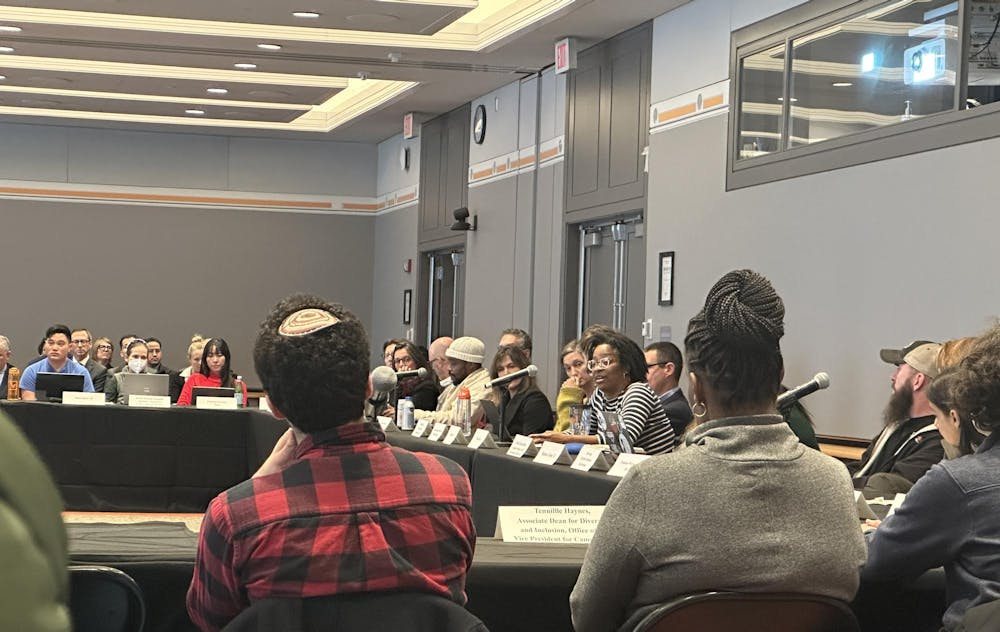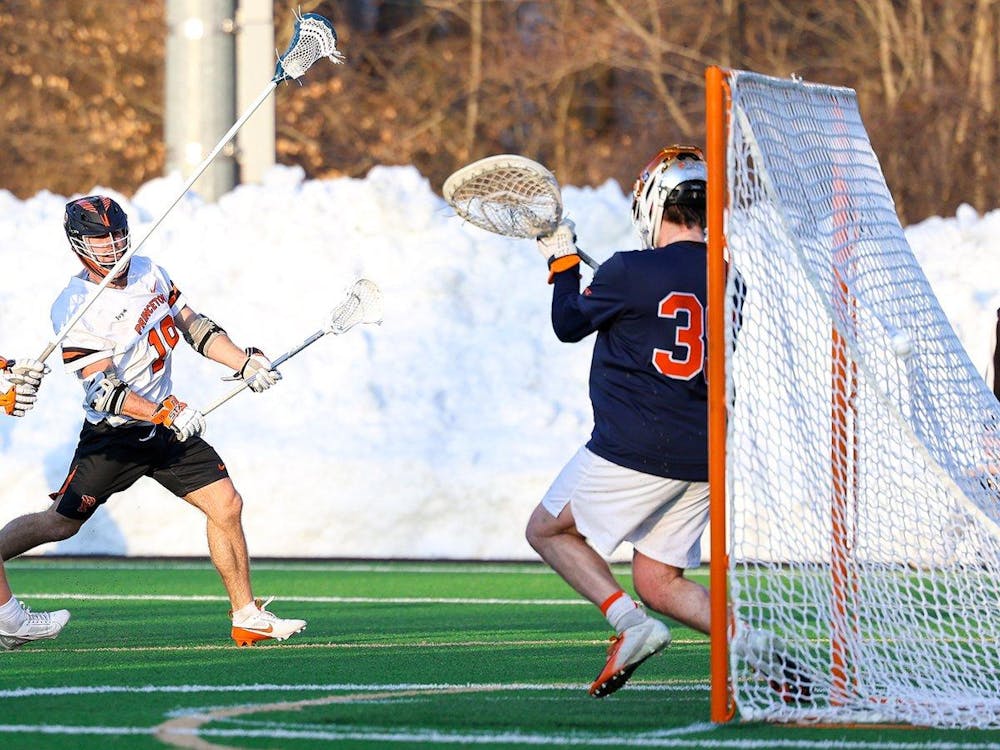Changes to admissions and the state of open discourse on campus were two big topics of discussion at the second Council of the Princeton University Community (CPUC) of the 2023–2024 academic year on Monday, Nov. 13. The CPUC meeting is the primary venue for different stakeholders of the University to engage in open discussion and present progress reports.
Here are some key takeaways from the meeting.
University administrators emphasize respectful dialogue amid campus protests on Israel and Palestine
While incidents on Princeton’s campus related to the conflict in Israel and Palestine have not garnered the same level of national media attention as incidents at other universities, disputes about filming have been apparent at a number of vigils and protests in support of Palestine events in recent weeks. With significant national media attention, students at other Universities have had personal information distributed widely: a truck at Harvard drove around displaying the faces and names of students who signed a letter placing blame for Hamas’ Oct. 7th attack on Israel.
After a question by U-Councilor Genevieve Shutt ’26 on whether the university was taking any steps to protect privacy and safety of student protesters at recent demonstrations regarding the conflict in Israel and Palestine, Vice Provost Michele Minter said that her office is “monitoring campus activity quite closely, both to protect protesters’ and counter protesters' right to voice their views.”
“We know that concerns about social media doxxing are real and deeply upsetting, and even threatening,” she said. “Students can arrange to remove their contact information from the directory by contacting the registrar's office, or [they] can ask campus life or grad school staff for assistance.”
She added that the office of institutional equity and diversity is “exploring the possibility of working with outside organizations with expertise in responding to doxxing incidents.”
In response to a similar question from Judah Guggenheim ’25 on the boundaries of speech, President Christopher Eisgruber '83 said that University protection of free speech “extends” to offensive speech, and encouraged members of the community to “openly and vigorously [contest] the ideas that they oppose” rather than limit speech.

Eisgruber also urged a higher standard of debate on the issue. Eisgruber said, “If people enter into discussion on this issue principally by shouting slogans that have an association with offense or with hurt or with harm or with hate, that has a tendency to promote that kind of [disrespectful] response.”
He continued, “For each of us, it's very important to try to enter into those conversations in a genuine spirit of dialogue and respect, the more often we can do that, that's going to elevate these conversations.”
No specifics on changes to admissions post-Supreme Court decision, Eisgruber tamps down expectation of changes to legacy admissions
In June, the Supreme Court ruled that colleges cannot consider race as a factor when making admissions decisions. The University currently has a committee investigating possible changes to the admissions process for future cycles.

Eisgruber noted that he felt admissions policies surrounding legacy applicants received a “disproportionate” amount of attention in the press, saying that the policy does not significantly impact the University’s demographics. There has been significant debate about the role of legacy admissions in admissions, with the United States Department of Education opening an investigation into Harvard University’s use of legacy in admissions.
Dean of Admissions Karen Richardson ’93 said the main change in admissions after the decision is that admissions officers will not have access to ethnic and racial demographic information during application review, but will review that information after matriculation in order to evaluate outreach efforts and report data to the U.S. Department of Education.
Additionally, the admissions office changed one of the Princeton-specific essay prompts, which asks students to consider their “lived experiences” and “life lessons.”
“We purposefully did not ask in such a way that applicants would feel the need to think about this question solely in terms of hardship, or discrimination,” she said. “We wanted it to be broader than that.”
Likewise, Dean of Graduate School Rodney Priestley said that graduate school will no longer have access to demographic data during the admissions process.
Graduate school admissions are specific to individual departments. Priestly said that all departments now require an essay about lived experiences.
U-Councilor Isabella Shutt ’24 questioned whether Princeton was cooperating with other schools and universities to find new ways to focus on students’ lived experiences in admissions.
Richardson said the University can share some of their efforts through the American Talent Initiative, but sharing current practices may risk “collusion.” However, she emphasized that next year, the ATI might allow more sharing of admissions practices between different universities.
Additionally, Eisgruber mentioned efforts to increase the University’s socioeconomic diversity through financial aid policies and QuestBridge.
Students propose making a committee on sexual climate permanent, whole body votes down measure
Isabella Shutt proposed making the Ad Hoc Committee on Sexual Climate, Culture, and Conduct a charter committee of the CPUC, making it a permanent committee. At the previous CPUC meeting, the committee was unanimously extended for another three years with the intent of improving the sexual climate on campus, including educating students on protective behaviors and improving outcomes for the LGBTQ community.
Dean of the Faculty Gene Jarrett, however, argued that a new Charter committee would lead to staffing challenges.
“I want to stress that we shouldn't underestimate the challenges of staffing such a committee in order to ensure the sustainability of governance and to make sure that you have the kinds of colleagues, students, and alumni who are able to serve,” he said. “It's important to take that into account as we think about the future of this as a standing committee.”
Daniel Shaw ’25, Aishwarya Swamidurai ’26, and Judah Guggenheim ’25, all U-Councillors, echoed the importance of establishing the Ad Hoc Committee as a permanent body.
Swamidurai acknowledged the concerns about staffing the committee, but also mentioned the “current momentum” spurred by the Undergraduate Student Government and the SHARE office.
“It's clear that there's been momentum with students from younger grades and members of the community who want to keep this work up,” she said. “I think that the work is going to continue no matter what, and I think there will be people to support that endeavor.”
The measure needed 34 votes to pass, but only received 29.
Shaw laments attendance problems, CPUC declines to allow proxy voting
Shaw also proposed a policy that would allow committee members on the CPUC to designate a person to vote in their place in the event that they would not be able to attend a meeting.
“It is no secret that attendance at CPUC meetings has been lacking in some previous sessions, with average attendance over the past few sessions hovering at barely over half,” he said. “Given that this body meets only six times a year, any absence is therefore of great importance and impact to those who have elected us.”
The committee, according to the CPUC Website, is comprised of 15 faculty members, seven graduate students, 10 undergraduate students, four alumni, and nine administration members not counting Eisgruber.
Shaw said that the Undergraduate Student Government and Graduate Student Government, which have experimented with proxy voting, have not seen a significant decrease in attendance since proxies have been allowed.
Anna Jacobson GS, president of the graduate student government, said she supported the amendment because it was useful for making quorum in meetings.
Alumni committee member Alleda Mack ’99 voted against the measure, saying that meeting six times a year was not an overtly difficult time commitment. She added that delegated bodies don’t use proxies in general. Eisgruber also voiced opposition to the proxy idea.
17 members of the committee voted in favor the motion, meaning it did not pass.
The next CPUC meeting is set for Monday, Dec. 11 at 4:30 p.m. in the Frist Multipurpose Room in Frist Campus Center.
Elisabeth Stewart is a News contributor for the 'Prince.'
Chris Bao is a News contributor for the ‘Prince.’
Please send corrections to corrections[at]dailyprincetonian.com.








